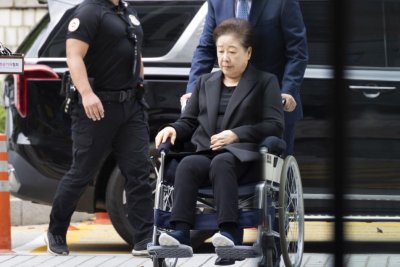Unification Church leader Han Hak-ja arrives for an arrest warrant hearing on allegations of bribery and political funding at the Seoul Central District Court in Seoul on September 22. Photo by Jeon Heon-kyun/EPA
SEOUL, Oct. 20 (UPI) — South Korea’s special prosecutor has launched an internal probe after investigators found a confidential roster of law enforcement officers inside a Unification Church office during a recent raid — a discovery that has intensified a widening corruption case linking religion, politics and the state.
The list, first reported by The JoongAng Ilbo newspaper, contained the names and assignments of police officers temporarily working at the Special Prosecutor’s Office. Such documents are normally restricted even within the agency.
Officials said they are investigating whether a retired police officer, identified only by the initial A, leaked the file to church officials.
An special prosecutor’s spokesperson said the office is “verifying how the document was obtained and whether any ongoing investigations were affected.” If confirmed, prosecutors say, the breach would mark one of the most serious leaks of investigative information in years, potentially allowing suspects to anticipate raids or destroy evidence.
Indictments for embezzlement, political-fund violations
The leak inquiry comes just days after prosecutors indicted Unification Church leader Hak Ja Han and two senior aides, Jung Wonju and Yoon Young-ho, on charges of embezzlement and illegal political donations.
According to charging documents filed Oct. 10, Han and Jung allegedly diverted money from church accounts earmarked for missionary work to finance luxury purchases and covert political activity.
Between May and August 2022, about 500 million won (about $380,000) was allegedly used to buy designer jewelry and handbags for Han, disguised through falsified expense reports. One transaction dated May 9, 2022, shows Jung instructing a finance officer to spend 42 million won on jewelry “for Hak Ja Han.”
Another section of the indictment cites roughly 900 million won ($700,000) moved from the “2027 Project Support Fund” into accounts controlled by Jung without approval from the church’s finance board. Prosecutors believe the funds were used for non-religious or political purposes, violating internal rules.
Donations to ruling party before 2022 election
Investigators also allege that the Unification Church, directed by Yoon Young-ho, its former secretary-general, channeled money to all 17 provincial branches of the ruling People Power Party around the time of the 2022 presidential election.
According to the special prosecutor’s findings, Yoon called regional leaders to a meeting in early March 2022 and instructed them to distribute “missionary support funds.” Roughly 2.1 billion won ($1.5 million) was withdrawn from church accounts, and 144 million won (about $105,000) was later delivered through split donations made under individual members’ names.
Prosecutors say the arrangement violated the Political Funds Act, which bars corporate or religious entities from contributing to political organizations.
A special prosecutor’s official, speaking on condition of anonymity because the investigation is continuing, said the case “shows signs of coordinated funding activity at a national level.”
Church denial
In a written statement, the Family Federation for World Peace and Unification — the church’s official name — denied wrongdoing, asserting that “all expenditures were legitimate and related to global missionary work.” Han’s defense team said she would cooperate fully while seeking to have the charges dismissed as “politically motivated.”
Han was indicted under the Act on the Aggravated Punishment of Specific Economic Crimes and the Political Funds Act. Jung was indicted without detention. Their first hearings are expected later this month at the Seoul Central District Court.
Broader implications for institutions, trust
The twin controversies — alleged embezzlement and the suspected leak of a classified roster — have raised alarm over the integrity of state institutions, as well as the political reach of major religious movements.
Legal commentators in Korean media have warned that, if verified, the leak could amount to obstruction of justice or a violation of the Public Official Information Protection Act, both of which carry heavy prison terms.
Local editorial writers have described it as a test of transparency — whether the rule of law can withstand influence from powerful organizations that straddle the line between religious authority and political power.
The Special Prosecutor’s Office said it has strengthened internal data-security protocols and restricted access to sensitive records.
